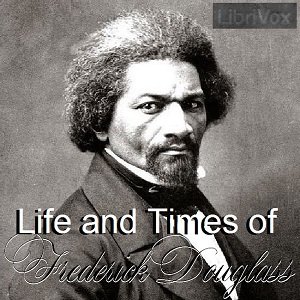
This, as far as I am aware, is the most complete of Frederick Douglass' autobiographies. His previous ones were mainly about his time in slavery. Frederick Doulgass has lived many lives. He was born on a slave plantation in a corner of Maryland so isolated it was like a nation onto itself, where the more brutal aspects of slavery could be practiced without scrutiny. He described the plantation and its workings, and his life there until he was sent to live in Baltimore to act as a house slave for a relative to his master. His narrative follows the masters he served and his experience under each, his first runaway attempt and finally his successful effort at running away, to his life as a free man, to his involvement with the abolitionist movement and his rise as a public figure. He describes the drastic changes that happened in the culture before and after the civil war, including his life as an old man returning to the plantations of his childhood and meeting on friendly terms former masters and their descendants.
The book explores a few fascinating ideas. One, personified in what Douglass called "the Slave System," is the way in which, when the society as a whole indulges in a particular pathology, the people who participate in it for it's social benefits, as well as the neighbors who don't whant to condemn their friends and loved ones, the neighbors and participants become voluntarily tainted. One neighbor justifies slavery so that he does not condemn his fellow neighbors. The slave-owner invents justifications for his actions as well, and it taints him. Similarly, the relation between slave and master becomes a hostile one, when without slavery the two individuals could have been friends. He discusses this relative to his second master, who expected him to be the house slave who watched over his son. As a consequence, the boy's mother saw Frederick more as the son's future protector than as a slave, and he was treated honorably until the Father learned she was teaching Frederick and her son to read. At this point he chastized her, going through all the reasons why masters shouldn't teach slaves to read (including the fact that it was illegal, and that the capacity to read will give him the power to see what else is being done to his people, and cause him to ultimately resent his masters and seek to escape). Following that lecture, the mother never treated him the same way. However, following the civil war, he visited the home of some of his masters (who were still living), and got on fine with them. It was the master-slave relationship that set them against one another.
Another interesting concept that I found counter-intuitive was the fact that slaves who resisted beatings, who fought back tooth and nail whenever the master or an overseer tried to chain them up and whip them, got the fewest beatings. The passive, obedient slave who is beaten most easily is beaten most often. This suggests that the integrity to yourself, and the willingness to stand up when necessary is useful even in a situation when you're technically powerless.
One final thought the book had instilled in me, dealt with the power of language to transform a society. Frederick struggled to educate himself both as a slave and as a free man, and in many ways it was his ticket to freedom. His speeches gave power to the abolitionist movement, and he mentions a major book released at the time "Uncle Tom's Cabin", which did a great deal to change the popular attitude towards slavery. This seems to correspond to things I've heard about what "The Gulac Archipelago" did to Soviet Russia. If true, then the truthful speech of an articulate individual can be enough to transform the world. I don't understand the full implications of this idea, and will be ruminating on them for some time. This book is excellent and I recommend it highly.
Ohh cool, is that the full audio book? ;D
@paps
Downvoting a post can decrease pending rewards and make it less visible. Common reasons:
Submit
Yes indeed. The reader did an excellent job on it as well.
Downvoting a post can decrease pending rewards and make it less visible. Common reasons:
Submit